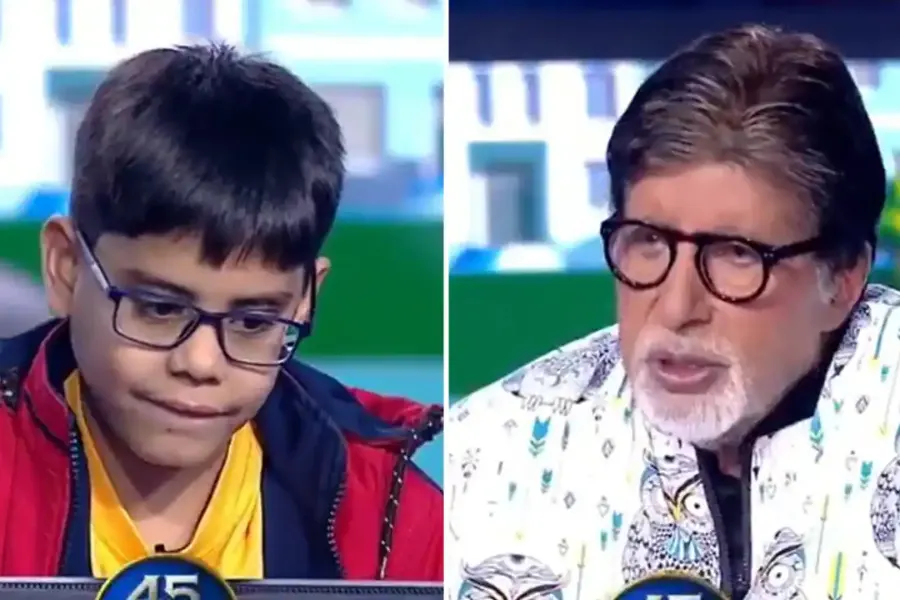KBC Contestant Ishit Bhatt Faces Backlash for Overconfidence
thenewsbuzz October 14, 2025 39
KBC Contestant Ishit Bhatt: The internet has never been slow to criticize, and this time it is 10-year-old Ishit Bhatt from Kaun Banega Crorepati (KBC) who is being memed, mocked, and debated. His confident, loud demeanor on a national platform divided opinion, and raised a broader question — are parents responsible for kids’ public behaviour?
Now, in a hyper-connected world where everything becomes content the second it happens, the conversation around Ishit on KBC has transitioned from a television program to commentary on society. Here’s a closer look at recent news updates and what this means for parenting, internet culture, and ourselves.
The Viral Event That Started It All
Young Ishit Bhatt, a fifth grader from Gujarat, became an immediate social media sensation when he appeared on Kaun Banega Crorepati, with his sprightly, confident answers, while others called his attitude to Amitabh Bachchan ‘rude’.
Instead of compliments for his cleverness and bravery, the child was bullied online. Even worse, his parents became collateral damage in the public’s anger toward a seemingly rude child, having charges of ‘bad parenting’ thrown at them by strangers based on a few minutes of footage.
Yet, how reasonable is it to turn a child’s momentary action or expression on television into a parenting indictment that encompasses the country?
Reasons for Children’s Behavior
Child psychologist Dr. Sushma Gopalan said that a child’s behavior goes hand in hand with both temperament and environment. “Some children are simply more expressive or more spontaneous. While others are more stable and observing.” Parenting frames these inherent characteristics “but doesn’t eliminate them,” she said.
What does that mean? A child’s confidence or bravery isn’t inherently about a bad upbringing. It’s a mixture of character, upbringing, and environment – all of which are operating in concert.
Reasons why we shouldn’t hold parents responsible for every mistake
Dr. Gopalan stated, “For parents to be complete vigilantes over every word and gesture from their child is unrealistic and unreasonable.” Even the best-behaved child can misbehave if they are exhausted, stressed, or overwhelmed.
Children receive signals not just from parents, but also from school, friends and media sources. What we often consider “impudent” or “entitled” is often simply a child who is overwhelmed and unable to manage their emotions in an unknown and high-pressure environment such as national television.
When Anxiety Looks Like Arrogance
Each child will show stage fright in a different way. For some, it might look like shyness; for others, it might look like over-assertiveness or humor.
“Enthusiasm and anxiety are often mistaken for arrogance,” states Dr. Gopalan. “Children display their emotions fully and dramatically — this does not mean a lack of respect.”
That burst of confidence might just be a way of defending themselves — a young mind trying to make sense among the chaos of flashing lights and the public eye.
The “Perfect Parent” Within 10 Seconds of Film
It is pretty foolish to judge a parent from a viral video. Parenting is an experience, that evolves along the way and has many obstacles, personal growth, and lessons learned behind closed doors.
“Good parenting is not just about raising perfect children. It is about raising children to be emotionally connected adults,” says Dr. Gopalan.
The truth is that no matter how good a parent you are and how closely you watch your children, you can’t stop them from screwing up in public — nor is it your job to.
What the Outcry Really Tells Us About Us
The outcry regarding Ishit Bhatt’s behavior says more about the norms that society values than about parenting per se. Dr. Gopalan states, “In our culture, we prize obedience and politeness more than authenticity.” “We expect children to show humility instead of having humility.”
In pursuit of the concept of “perfect behavior,” we forget that children are always learning — and public punishment can hurt emotionally. Online trolling can seem harmless, but for children, it can knock their confidence and self-esteem for years.
The Takeaway
In the end, a three minute encounter on live TV shouldn’t define a child or what their parents do. After all, everyone makes mistakes while they are growing — children and adults alike.
Maybe we should stop expecting perfection from children, and think about our own need for kindness and self-control on the internet. The real lesson in humility isn’t even for children — it’s for us.






majapahit4d
majapahit4d
mahjongways
mahjongways
**mindvault**
mindvault is a premium cognitive support formula created for adults 45+. It’s thoughtfully designed to help maintain clear thinking
**mind vault**
mind vault is a premium cognitive support formula created for adults 45+. It’s thoughtfully designed to help maintain clear thinking
**prostadine**
prostadine is a next-generation prostate support formula designed to help maintain, restore, and enhance optimal male prostate performance.
**sugarmute**
sugarmute is a science-guided nutritional supplement created to help maintain balanced blood sugar while supporting steady energy and mental clarity.
**gl pro**
gl pro is a natural dietary supplement designed to promote balanced blood sugar levels and curb sugar cravings.
**zencortex**
zencortex contains only the natural ingredients that are effective in supporting incredible hearing naturally.
**mitolyn**
mitolyn a nature-inspired supplement crafted to elevate metabolic activity and support sustainable weight management.
**yusleep**
yusleep is a gentle, nano-enhanced nightly blend designed to help you drift off quickly, stay asleep longer, and wake feeling clear.
**prodentim**
prodentim an advanced probiotic formulation designed to support exceptional oral hygiene while fortifying teeth and gums.
**synaptigen**
synaptigen is a next-generation brain support supplement that blends natural nootropics, adaptogens
**vitta burn**
vitta burn is a liquid dietary supplement formulated to support healthy weight reduction by increasing metabolic rate, reducing hunger, and promoting fat loss.
**nitric boost**
nitric boost is a dietary formula crafted to enhance vitality and promote overall well-being.
**glucore**
glucore is a nutritional supplement that is given to patients daily to assist in maintaining healthy blood sugar and metabolic rates.
**wildgut**
wildgutis a precision-crafted nutritional blend designed to nurture your dog’s digestive tract.
**pineal xt**
pinealxt is a revolutionary supplement that promotes proper pineal gland function and energy levels to support healthy body function.
**energeia**
energeia is the first and only recipe that targets the root cause of stubborn belly fat and Deadly visceral fat.
**boostaro**
boostaro is a specially crafted dietary supplement for men who want to elevate their overall health and vitality.
**prostabliss**
prostabliss is a carefully developed dietary formula aimed at nurturing prostate vitality and improving urinary comfort.
**potent stream**
potent stream is engineered to promote prostate well-being by counteracting the residue that can build up from hard-water minerals within the urinary tract.
**breathe**
breathe is a plant-powered tincture crafted to promote lung performance and enhance your breathing quality.
**hepatoburn**
hepatoburn is a premium nutritional formula designed to enhance liver function, boost metabolism, and support natural fat breakdown.
**hepatoburn**
hepatoburn is a potent, plant-based formula created to promote optimal liver performance and naturally stimulate fat-burning mechanisms.
**cellufend**
cellufend is a natural supplement developed to support balanced blood sugar levels through a blend of botanical extracts and essential nutrients.
**prodentim**
prodentim is a forward-thinking oral wellness blend crafted to nurture and maintain a balanced mouth microbiome.
**neuro genica**
neuro genica is a dietary supplement formulated to support nerve health and ease discomfort associated with neuropathy.
**flowforce max**
flowforce max delivers a forward-thinking, plant-focused way to support prostate health—while also helping maintain everyday energy, libido, and overall vitality.
**revitag**
revitag is a daily skin-support formula created to promote a healthy complexion and visibly diminish the appearance of skin tags.
**sleep lean**
sleeplean is a US-trusted, naturally focused nighttime support formula that helps your body burn fat while you rest.
**memory lift**
memory lift is an innovative dietary formula designed to naturally nurture brain wellness and sharpen cognitive performance.
Giving a shot at 234vip22. Website looks clean and is easy to understand. Seems promising, will update after I’ve played a bit more. Go see for yourself at 234vip22.
Hey, found milwingame.info. Seems like it’s the official spot for the milwingame. I need to check it out, if it’s something you’re interested in, give milwingame a try!
For those into the world of matka and satta, 777dpboss143 Seems ok. Standard site and pretty much the same as the others. Worth a spin: 777dpboss143
Spinning the reels on 777win66 tonight. Fingers crossed for that lucky 7! Anyone else playing there? I am feeling lucky, check it out 777win66.
Yo, jili golden empire is next level stuff. Playing it all the time! Fun and addicting! See for yourself: jili golden empire
Alright, betvn1vip, let’s see what you got! Gave it a whirl, and it’s not bad, not bad at all. Good selection. Could use a little something extra, but overall, I’m feeling it. You might dig it too! betvn1vip